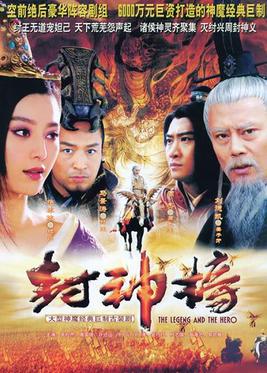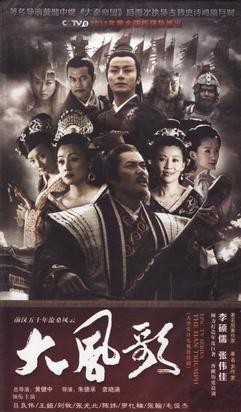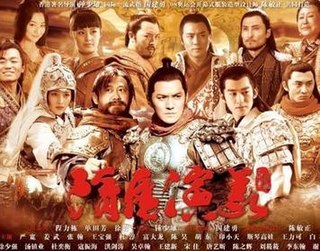
The Emperor in Han Dynasty, also released under the title The Emperor Han Wu in some countries, is a 2005 Chinese historical drama television series based on the life of Emperor Wu of the Han dynasty. It uses the historical texts Records of the Grand Historian and Book of Han as its source material.

Romance of the Three Kingdoms is a Chinese television series adapted from the classical 14th century novel of the same title by Luo Guanzhong. The series was produced by China Central Television (CCTV) and was first aired on the network in 1994. It spanned a total of 84 episodes, each approximately 45 minutes long. One of the most expensive television series produced at the time, the project was completed over four years and involved over 400,000 cast and crew members, including divisions of the People's Liberation Army from the Beijing, Nanjing and Chengdu military regions. Some of the dialogues spoken by characters were adapted directly from the novel. Extensive battle scenes, such as the battles of Guandu, Red Cliffs and Xiaoting, were also live-acted.

Three Kingdoms is a 2010 Chinese television series based on the events in the late Eastern Han dynasty and the Three Kingdoms period. The plot is adapted from the 14th century historical novel Romance of the Three Kingdoms and other stories about the Three Kingdoms period. Directed by Gao Xixi, the series had a budget of over 160 million RMB and took five years of pre-production work. Shooting of the series commenced in October 2008, and it was released in China in May 2010.

The Water Margin is a 1998 Chinese television series adapted from Shi Nai'an's classical 14th-century novel of the same title. It was produced by CCTV with Zhang Jizhong as producer. It was first broadcast in China in January 1998. The series also featured action choreography by Yuen Woo-ping.

The Legend and the Hero is a 2007 Chinese television series adapted from the 16th-century novel Fengshen Yanyi written by Xu Zhonglin and Lu Xixing. The first season started airing on CCTV-8 in February 2007. It was followed by a sequel, The Legend and the Hero 2 in 2009.

All Men Are Brothers is a 2011 Chinese television series adapted from Shi Nai'an's 14th century novel Water Margin, one of the Four Great Classical Novels of Chinese literature. The series is directed by Kuk Kwok-leung and features cast members from mainland China, Taiwan and Hong Kong. The series was first broadcast on 8TV in March 2011 in Malaysia.

Outlaws of the Marsh is a Chinese television series adapted from Shi Nai'an's classical 14th century novel Water Margin. It was first broadcast on Shandong TV in China in 1983, and was not completed until 1986. The series was one of the earliest television dramas with an ancient China setting to be produced in mainland China. It was divided into different parts, each focusing on the story line of a certain character. Widely regarded as a classic in mainland China, the series won a Golden Eagle Award.

The Rise of the Tang Empire is a Chinese television series based on the events in the Zhenguan era during the reign of Emperor Taizong of the Tang dynasty. The 50 episodes long series is directed by Zhang Jianya and written by Ah Cheng and Meng Xianshi. It was first broadcast on BTV in China in December 2006.

The Han Triumph, also known as Wind Ode, is a Chinese television series based on historical events in the early Han dynasty, beginning with the founding of the dynasty by Liu Bang after his triumph over Xiang Yu, and the events leading to the reign of Liu Heng. Directed by Huang Jianzhong, the series starred Ray Lui, Wang Ji, Liu Mu, Zhang Guangbei, Chen Wei and Li Qingxiang in the leading roles. It was first broadcast on CCTV-8 in China on 17 December 2011.

Justice Bao is a Chinese TV series starring producer Jin Chao-chun as the Song dynasty official Bao Zheng. The series ran for 3 seasons from 2010 to 2012. In addition to Jin, Kenny Ho, Fan Hung-hsuan and Lung Lung again reprise their iconic roles from the 1993 Taiwanese hit Justice Pao and the 2008 Chinese series Justice Bao.

Tang Ming Huang is a Chinese television series based on historical events in the reign of Emperor Xuanzong of the Tang dynasty. The series was directed by Chen Jialin and starred Liu Wei as the eponymous emperor. It was first broadcast on CCTV-1 in 1990 in mainland China.

Wu Zi Bei Ge, also known as Wu Zi Bei Ge: Wu Zetian Zhuan, is a 2006 Chinese television series based on the life of Wu Zetian, the only woman in Chinese history to assume the title of "Empress Regnant". The series was directed and written by Chen Yanmin, and starred Siqin Gaowa and Wen Zhengrong as the empress. The series' title Wu Zi Bei Ge literally means "Song of the Uncharactered Stele", with the "stele" referring to the unmarked one standing near Wu Zetian's tomb at the Qianling Mausoleum.

Heroes in Sui and Tang Dynasties is a Chinese television series based on Chu Renhuo's historical novel Sui Tang Yanyi, which romanticises the historical events leading to the fall of the Sui dynasty and the rise of the Tang dynasty. The series was first broadcast in mainland China on various television networks on 14 January 2013. It is not to be confused with Heroes of Sui and Tang Dynasties 1 & 2, a similar television series also based on the novel, but was released earlier in December 2012. Filming for the series started on 5 November 2011 at the Hengdian World Studios and wrapped up in May 2012.
The Legend of Crazy Monk is a Chinese television series about the life of Ji Gong. The series was directed by Lin Tianyi and based on Guo Xiaoting's classical novel Biography of Ji Gong. It was a hot TV series recently in Guangdong Television, Jiangsu Television and Shenzhen Television. It is shown on Mediacorp Channel 8 at 7pm.

God of War, Zhao Yun, also known as Chinese Hero Zhao Zilong, released under the title Dynasty Warriors in Indonesia, is a 2016 Chinese television series directed by Cheng Lidong and produced by Zhejiang Yongle Entertainment Co., Ltd. The series starred cast members from mainland China, South Korea and Taiwan: Lin Gengxin, Im Yoon-ah and Kim Jeong-hoon. The story is loosely adapted from the 14th-century Chinese classical novel Romance of the Three Kingdoms, with Zhao Yun as the main character. It was first aired on Hunan TV from 3 April to 7 May 2016.
The China Badminton Super League (CBSL) (Chinese: 中国羽毛球俱乐部超级联赛) is the prime National team competition for badminton players in China. The China Badminton Super League was re-launched in 2009 after a failing attempt seven years earlier. Liu Fengyan, director of the Table Tennis and Badminton Administration Center under China's State General Administration of Sport, announced the re-launch during the 50th anniversary meeting of the Chinese Badminton Association.














